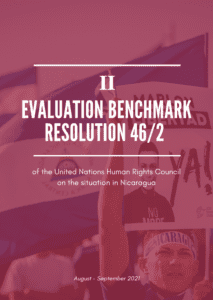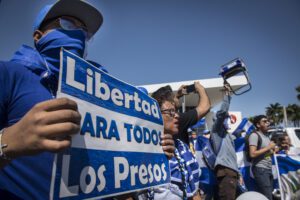8M-International Women’s Day: Recognize and protect women’s leadership from an intersectional perspective
Washington DC, March 8, 2022. – The fight of women for their rights has been tireless. Although Latin America is going through critical moments in terms of democracy, human rights and security, women remain firm in the process of denouncing the violence they face and advocating for structural changes. This International Women’s Day, the Institute on Race, Equality and Human Rights (Race and Equality) wants to draw attention to the importance of recognizing and protecting women’s leadership, and that this be done at all levels of society from an intersectional perspective.
We recognize that women’s life experiences are directly influenced by their gender, as well as other characteristics such as their race or ethnicity, their gender identity and expression, and the role they play in society. In this way, women human rights defenders, Afro-descendants, indigenous, lesbian, trans and women journalists, to name a few, face particular situations when exercising their leadership or their professions, which often threaten their integrity and put their lives at risk.
Below, we provide an overview of the specific problems faced by different groups of women in the region. At the same time, women from Nicaragua, Brazil, Colombia, Cuba, Peru, and the Dominican Republic offer their perspectives on how their activism and professional work are marked by the adverse contexts that prevail in their countries.
Defending Rights in a Dictatorship
Women have been active subjects and protagonists in the defense of human rights and in civic resistance since before the social unrest in Nicaragua in April 2018. In the current context, characterized by systematic state and parapolice violence, women defenders, activists, and journalists are targets of persecution, harassment, siege, threats, and deprivation of liberty. These attacks expose them to even greater risks because of their gender.
According to records from the Nicaraguan Initiative of Human Rights Defenders (IND) and the Autonomous Women’s Movement (MAM), since the beginning of the crisis in April 2018, at least 109 women defenders and activists have been arbitrarily detained, and there have been more 4,000 attacks on defenders. On the other hand, at least 12 released women have reported having been victims of some type of rape, among other attacks; and 13 women (5 of them older adults) continue to be deprived of liberty for political reasons and without adequate medical care in detention centers.
The President of the Nicaraguan Center for Human Rights (CENIDH), Vilma Núñez de Escorcia, affirms that, historically, women political prisoners have suffered serious differentiated aggressions within detention centers. She recalls that, as a political prisoner of the Somoza dictatorship, her greatest fear was that “she would be transferred to the Somoza State Security Directorate, where there was a history of sexual violations of political prisoners.” Now, she denounces that the government of Ortega and Murillo, through “perverse police officers” subjects women political prisoners to isolation, incommunicado detention, prolonged interrogations, and other forms of psychological and physical torture. She cites the cases of Suyén Barahona, Tamara Dávila, Dora María Téllez, and Ana Margarita Vijil, who have spent almost 9 months in isolation cells.
Ana Lucía Álvarez, who is a human rights defender and a relative of three political prisoners, explains that women defenders are victims of sexualized attacks such as touching, nudity, sexual torture, network dismantling, among others. Likewise, she denounces that “in one of the trials of a political prisoner, the prosecutor’s narrative was related to whether she had a partner, whether she had had sexual relations with this or that person. These are narratives that do not appear in the trials of men who are political prisoners but do appear in the trials of women who are being prosecuted and criminalized,” she concludes.
Fighting and Surviving Transphobia
In Brazil, where civil society organizations constantly denounce the wave of violence against human rights defenders, in addition to being the country with the most murders of trans people in the world, trans women who hold public office face hate speech and lack of State protection every day. “In the 2020 elections, some 30 trans/transvestite women were elected and in the exercise of their mandates their lives are threatened, which demonstrates and justifies that we are (…) in dispute over the social project,” says Ariela Nascimento, a trans woman and parliamentary adviser to Councilwoman Benny Briolly (Niterói-RJ), who is also a trans woman.
Ludymilla Santiago, a trans leader for more than 13 years who raises her voice for women’s rights from a non-binary and inclusion perspective, points out that the issue of identity is very important for trans women and that the discourse on being a woman goes far beyond current social impositions. “We must evolve and make this diversity more and more represented to break the patriarchal hegemony,” she says.
Confronting Violence and Racism
The armed conflict in Colombia—whose greatest impact has been in areas with Afro-descendant populations—has differentially affected Afro-descendant women in the country. Among the main effects is sexual violence. According to figures from the Single Registry of Victims, 20% of all women victims of sexual violence are Afro-descendants. Luz Marina Becerra, representative of the Coordination of Displaced Afro-Colombian Women in Resistance La COMADRE, emphasizes the gaps of inequality, racism and discrimination that black, Afro-Colombian, Raizal, and Palenquera women have to face, thus making it impossible to effectively enjoy their rights.
The COMADRE has been requesting the State to comply with Resolution No. 2016-244846 for 5 years now, through which its registration in the RUV was ordered and it was recognized as an ethnic subject of collective reparation under the terms of Decree Law 4635 of 2011. However, after 5 years and numerous requests to start with this route through prior consultation, they have been denied by different state agencies, ignoring their fundamental rights.
Practicing Journalism to Resist Censorship and Violence
According to the Inter-American Commission on Human Rights (IACHR) and its Office of the Special Rapporteur on Freedom of Expression, Cuba is the country in Latin America with the fewest guarantees for the exercise of freedom of expression and, therefore, freedom of the press. The independent press on the Island constantly faces government censorship, harassment, and repression and, in the midst of this reality, women journalists suffer different impacts.
In the “Paper Democracy” report, the organization Article 19 reports “systematic and generalized attacks that are implemented to suffocate journalism.” It details that, during 2019, they documented that a journalist on average could be attacked up to five times in a year, but in 2020 the average increased to six times and, in 2021, it rose to eight times. And in the case of women, this situation is aggravated, since on average a journalist was attacked eight times a year in 2020 and up to 11 in the first half of 2021.
On repeated occasions, the journalist María Matienzo has been the target of interrogations, harassment, and smear campaigns on social networks in which her gender and gender expression are the focus of attack. She considers that practicing journalism in such an adverse context does not make her an activist, but she is clear that this profession forces her to cross the borders of writing and ends up accompanying other women who have suffered violence. “Hopefully saying what you think in the midst of so much adversity is some kind of leadership because sometimes we have no choice but to disagree if we want to live with some dignity,” she says.
Advocating for Equality
In Peru, lesbian women are joining forces to achieve the adoption of policies in favor of their rights to equality and non-discrimination. In the recent CEDAW Committee review of the State, a coalition called #LesbianasCEDAW advocated for this body to make specific recommendations on their rights, based on the main problems they face. One of their demands is to strengthen and implement the comprehensive sex education policy that recognizes lesbian children and adolescents as subjects of rights, in order to prevent and address all forms of violence.
Likewise, they demand that the Congress of the Republic modify article 234 of the Civil Code through the approval of legislative initiative 525/2021-CR, a bill on same-sex marriage, and that the National Registry of Identification and Civil Status (RENIEC) apply article 2050 of the Civil Code, which establishes the recognition of rights acquired abroad; the latter due to the non-recognition of the marriages of lesbian women who marry outside the country and of their children.
“In the Peruvian case, feminist lesbians have contributed to expanding the essential content of the right to equality and non-discrimination to incorporate the prohibition of discrimination based on sexual orientation and gender identity. Likewise, to understand that lesbians and women in general do not want to be equal to men, but rather we think about equality considering differences and access to freedoms, rights, goods, and power,” says María Ysabel Cedano García, a Quechua lesbian feminist socialist.
Accompanying Discriminated Migrant Women
In recent months, the Government of the Dominican Republic has been criticized for the application of a measure that consists of deporting pregnant Haitian women. To date, some media reports the deportation of between 200 and 300 women in this condition. This situation has become a new cause of concern for the Dominican-Haitian Women’s Movement (MUDHA).
In this sense, Jenny Morón, from the Legal Department of said organization, shares that she feels privileged to have the opportunity to raise her voice on behalf of other migrant women who suffer this and other types of violence. “When I speak for women, I speak for my generation, for my offspring, I think I am building a foundation for my daughter and granddaughters to live in a world that is less discriminatory and more equal,” she affirms.
This International Women’s Day, from Race and Equality, we express our utmost admiration and respect for the work carried out by thousands of women for the recognition and guarantee of their rights. We will continue accompanying them. We also call on States to adopt laws and policies that protect their activism and professions in line with international human rights standards and, in addition, respond to their demands; all this taking into account that women are diverse and that their life experiences are marked by their characteristics and the roles they play in society. We ask the human rights systems to be protagonists in the development of national and regional standards for the protection of women, offer technical assistance to States for the adoption and implementation of the same, and recognize the diverse and intersectional identities of women.




